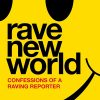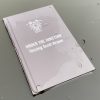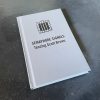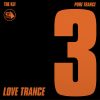
The Man was Bill Drummond’s 1986 solo album on Creation Records, meant as a farewell to his previous musical past at the age of 33.
With his interest slowly fading and after having spent half a million pounds at WEA trying to get Brilliant into the charts without any success, Bill finally decided to leave the music business behind.
Despite an impressive list of musicians he had worked with until then, Bill chose instead to work with Anglo-American alternative pop rock band Voice Of The Beehive, and Australian indie-rock band The Triffids whose pedal steel player Graham Lee would appear on The KLF’s Chill Out a couple of years later.
The Man is probably best known for the song Julian Cope Is Dead, a tongue-in-cheek fictional story of how Drummond shoots The Teardrop Explodes’ front singer Julian Cope to fuel his stagnating career (Drummond being the Teardrops’ former manager) and make him ‘bigger than the Beatles, for sure.’
The album closes on Such A Parcel Of Rogues In A Nation, a diatribe against England’s historical treatment of Scotland originally written by Robert Burns in 1791, recited by Bill’s father, Rev Jack Drummond.
Initially an LP release only the label also put out a timely CD re-release of The Man in 1990. This was probably to cash in on Drummond’s success with The KLF.
The King Of Joy & The Manager
Following the album’s release Creation Records released The King Of Joy, the last track Bill had recorded for the album, as a 12″ single the following year.
Included on the B-side was The Manager, the soundtrack of a video shot by Bill Butt which was a rant about the state of the music industry. In it he demands musicians not to spend any more than then days recording their LPs, and the abolishment of advances as ‘no really great music has ever come from a band that’s got themselves a big advance.’
I did it cos it was cheap and we needed a B-side. It’s a sort of layman’s-eye-view of the pop business. The view of some guy you meet in the pub, or a cab driver, and you make this terrible mistake of letting him know you’re in the music business, and he starts giving you his theory about it – ‘Fuckin’ Duran Duran, eh?…’ It was kind of cynical but I really felt I had a future as an artist rather than someone behind the scenes.
Furthermore Bill suggests to become ‘the manager of the complete music thing’, inviting everybody to write him for his advice and personal guidance for a mere one hundred pounds enclosed as a cheque.
Before the record had even been released, I’d received a couple of cheques. I can’t say who they’re from but I’ve got £200, so the video’s more or less paid for.
However, Bill did not follow through with his offer, in turn following advice from his own manager.
As soon as I’d finished ‘The Manager’, my manager said, Don’t do it – don’t try and attempt what I was setting myself up as on the record. He said I should stop telling other people what they should do and just do what I want.
Reviews
Tracks & Formats
The Man (CRELP 014)
| LP Album / 1986 | ||
| A1 | True To The Trail | 2:47 |
| A2 | Ballad For A Sex God | 3:56 |
| A3 | Julian Cope Is Dead | 2:06 |
| A4 | I Want That Girl | 3:06 |
| A5 | Going Back | 3:54 |
| B1 | Queen Of The South | 2:25 |
| B2 | I Believe In Rock & Roll | 3:35 |
| B3 | Married Man | 2:12 |
| B4 | I’m The King Of Joy | 2:43 |
| B5 | Son Of A Preacher Man | 3:37 |
| B6 | Such A Parcel Of Rogues In A Nation | 2:45 |
The Man (CRECD 014)
| CD Album / 1990 | ||
| 1 | True To The Trail | 2:53 |
| 2 | Ballad For A Sex God | 3:58 |
| 3 | Julian Cope Is Dead | 2:07 |
| 4 | I Want That Girl | 3:13 |
| 5 | Going Back | 3:57 |
| 6 | Queen Of The South | 2:25 |
| 7 | I Believe In Rock & Roll | 3:39 |
| 8 | Married Man | 2:12 |
| 9 | I’m The King Of Joy | 2:45 |
| 10 | Son Of A Preacher Man | 3:41 |
| 11 | Such A Parcel Of Rogues In A Nation | 2:46 |
The King Of Joy (CRE 039 T)
| 12″ Single / Mar 1987 | ||
| A1 | The King Of Joy | |
| A2 | I Want That Girl (Version) | |
| B | The Manager (The Complete Soundtrack Of The Video) | |
“I Want That Girl (Version)” is a mostly-instrumental version of “I Want That Girl” with added trumpet parts not in the original album version. Original lead vocals are removed, but the backing vocals remain.






“Such A Parcel Of Rogues In A Nation, a diatribe against England’s historical treatment of Scotland”. What utter pish! The writer of the abover article obviously has not read the poem, listened to the words or made any attempt to understand what Burns was writing about or saying. It is an accurate summation of the handfull of Scots Politicians who sold Scotland’s sovereign rights away on 1707. Burns refers to them as a “coward few” and “hireling traitors”. At no point does Burn’s speak ill of England, the English or of any ill-treatment by the English. Burns merely writes of the political maneuovering by a small cluster of Scottish Politicians who (completely undemocratically) betrayed Scotland’s interests through the 1707 Act of Union. Those ‘coward few, hireling traitors’ only looked after their own vested interests. Read and learn.
Farewell to all our Scottish fame
Farewell our ancient glory
Farewell even to our Scottish name
Sae fam’d in martial story
Now Sark runs over the Solway sands
And Tweed runs to the ocean
To mark where England’s province stands:
Such a parcel of rogues in a nation!
What force or guile could not subdue
Through many warlike ages
Is wrought now by a coward few
For hireling traitor’s wages
The English steel we could disdain
Secure in valour’s station
But English gold has been our bane:
Such a parcel of rogues in a nation!
I would, or I had seen the day
That treason thus could sell us
My auld gray head had lain in clay
Wi’ Bruce and loyal Wallace!
But pith and power, till my last hour
I’ll make this declaration
We were bought and sold for English gold:
Such a parcel of rogues in a nation!